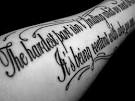Symbolism sometimes includes specific images included or excluded because of religious reasons, choices involving colors with religious significance, and "religious accommodation" policies regarding the wear of "religious apparel" and "grooming" (such as "unshorn" hair and beards worn for religious reasons) with military uniforms. Additionally, military chaplains themselves are sometimes regarded as "symbols of faith" for military personnel who face challenges to their faith and values.

get a full sleeve tattoo.
600 × 450 - 55k - jpg
slodive.com

get a full sleeve tattoo.
600 × 450 - 55k - jpg
slodive.com
get a full sleeve tattoo.
600 × 450 - 55k - jpg
On July 29, 1775, the Continental Congress established the military chaplaincy, but chaplains did not wear insignia until 1880. However, in 1835 Army regulations prescribed black as the branch color for chaplains, directing that a chaplain wear a black coat. By 1861 US Army Regulations included the details that the chaplains should wear a single breast officer's frock coat made of black wool, with black cloth covering the buttons, and no shoulderboards. In 1864, the Army Uniform Board "enhanced" the frock coat by adding black "herringbone braid" in across the chest at the buttons and buttonholes, with buttons still covered in black. This coat was used by Army Chaplains until 1880, when shoulder boards were authorized for chaplains for the first time, and the first official insignia was introduced.
get a full sleeve tattoo.
600 × 450 - 55k - jpg
slodive.com

get a full sleeve tattoo.
600 × 450 - 55k - jpg
slodive.com
get a full sleeve tattoo.
600 × 450 - 55k - jpg
On July 29, 1775, the Continental Congress established the military chaplaincy, but chaplains did not wear insignia until 1880. However, in 1835 Army regulations prescribed black as the branch color for chaplains, directing that a chaplain wear a black coat. By 1861 US Army Regulations included the details that the chaplains should wear a single breast officer's frock coat made of black wool, with black cloth covering the buttons, and no shoulderboards. In 1864, the Army Uniform Board "enhanced" the frock coat by adding black "herringbone braid" in across the chest at the buttons and buttonholes, with buttons still covered in black. This coat was used by Army Chaplains until 1880, when shoulder boards were authorized for chaplains for the first time, and the first official insignia was introduced.
Subscribe to:
Post Comments (Atom)















No comments:
Post a Comment